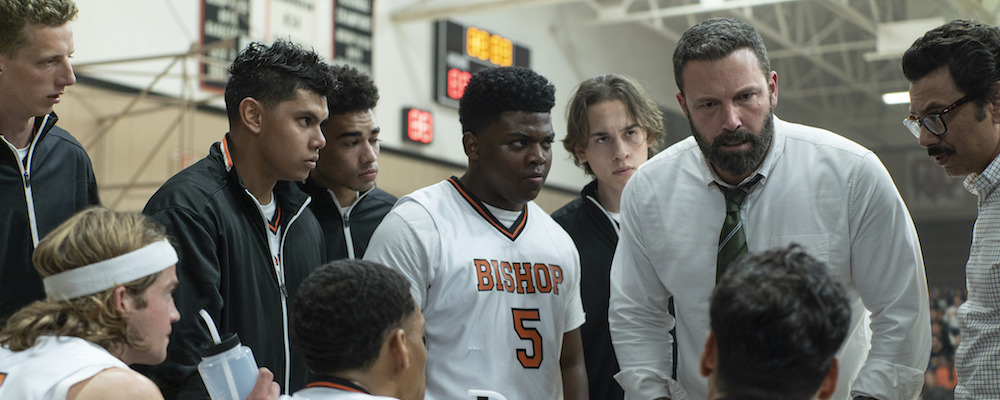Ben Affleck Puts His Demons on the Court in ‘The Way Back’
Alci Rengifo
There are moments where a film becomes more about its lead performance than even the story itself. This tends to happen when the subject matter hits very close to home. In “The Way Back” there is little doubt that Ben Affleck feels every frame and action by his character to the fullest, utilizing this story as a way to evoke his own trials. It’s not your typical sports movie full of larger than life heroes and tension-inducing countdowns. Instead what we get is a character study that feels so personal we can forgive its weaker elements.
Affleck plays Jack Cunningham, who used to be a big high school basketball star but turned away a full ride scholarship to the University of Kansas. Now separated and working in construction, Cunningham finds solace only the alcohol he endlessly consumes. Out of the blue his alma mater, Bishop Hayes High, comes calling in need of a new basketball coach. Cunningham reluctantly agrees and finds himself in charge of a group of typical restless teens who have sloppy training and even sloppier discipline. The first few games are a bust but Cunningham soon starts rediscovering an edge he thought he lost, pushing the team to not play nice and even rattling the Catholic order in charge of the school. But always lurking beneath the surface is Cunningham’s alcoholism and unprocessed scars from his marriage.
Director Gavin O’Connor gives this material a little more grit than the average basketball movie. O’Connor also directed “Warrior,” a movie about mixed martial arts which was also more about the family conflict trapping the lives of its characters. The typical sports romp is something like “Glory Road,” where the coach is larger than life and players become individual melodramas onto themselves. In “The Way Back” the coach is a shadow of a former, greater person and the players all have individual traits, some quite funny, but the game itself is rarely the focus. It’s here where the script by O’Connor and Brad Ingelsby falters slightly because we only get snippets of the other personalities. Standouts include Melvin Gregg as Marcus, a cocky kid who always shows up late until Cunningham forces him to reconsider his attitude and Brandon Wilson as the best player on the team who Cunningham encourages to take the lead. We get mere glimpses into these students. They fade away into the background. A more prominent supporting role is Dan (Al Madrigal), the low-mannered assistant coach who begins to suspect Cunningham is hiding a drinking problem. The actual game scenes have a bit more ferocity, and O’Connor manages to momentarily place us within the tension of players making passes, going for baskets and the utter chaos of a coach trying to command strategy.
“The Way Back” works better when it is seen as a vehicle to channel Ben Affleck’s chance to evoke his own recent experiences via his craft. It’s the kind of movie where you simply cannot separate the performance onscreen from the recent headlines about Affleck’s battles with alcoholism. A Best Picture Oscar-winning director, who was a Hollywood golden boy for years before suddenly falling into a loop of addiction and box office duds, Affleck makes a comeback here playing a man who almost tasted glory before tossing it away. He plays Cunningham with a quiet, boiling pain. He pours vodka into his thermos before going to work and pops can after can of beer from a stocked fridge at home. When others point out what they see he gets defensive or snaps. His ex-wife Angela (Janina Gvankar) obviously cares for him, even as she’s moved on to a new man, but seems powerless to do anything than offer moral support. When we discover what drove Cunningham to drink it makes sense in a tragic way. Yet Affleck brings an empathy and sensitivity to it that is unmistakable for how personal it feels. If the basketball scenes are not the most groundbreaking and if the story itself runs a bit thin, individual moments with Affleck give the film a strong punch. When he’s confronted by his superiors over his drinking his hands shake and voice tremble with a heartbreaking sincerity. There are echoes of roles like Jeff Bridges in “Crazy Heart.”
O’Connor avoids cheap sentimentality in “The Way Back.” The ending closes on an unexpected but truthful note. Lives don’t just settle everything with easy movie answers. It’s this spirit to the story that makes “The Way Back” work better than it should or probably would with another director or actor. Even a bare bones script can become something else when the role is inhabited by an actor like Affleck, who plays it like a man who has walked this long, hard road before.
“The Way Back” opens March 6 in theaters nationwide.

